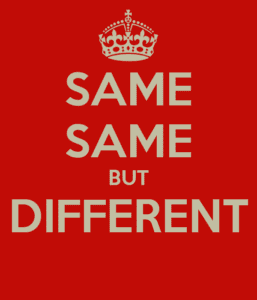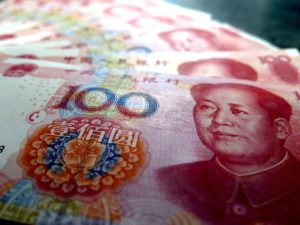Had an interesting discussion the other day with two international entrepreneur clients on global prejudices. Both told me of how they “take advantage” of it by hiring women, racial and ethnic minorities, and persons with disabilities in countries where other businesses are reluctant to hire these people.
And let’s face it, these prejudices exist, at least to some degree, in every country.
One of these entrepreneurs told me of how his small factory in Russia had hired one person with a physical disability and that person ended up recommending a whole slew of his friends with disabilities and in fairly short order, 22 of his 40 employees are people with disabilities. He then bragged of how he was able to get great employees in this mid-sized Russian city. He paid his employees with disabilities the same wages as the rest of his employees (which he said was about 10% more than the market rate) and he was constantly looking for more. He freely pled guilty to favoring the hiring of people with disabilities because those employees “missed work way less often, were far more productive when at work, and far more likely to stay.” They also seemed “happier to be there and had much better attitudes.” As he put it, by being one of the only employers in town who actively sought out people with disabilities “I was able to ‘arbitrage’ some pretty incredible employees.” He even said that by the time he sold this factory, a number of other companies in town had come to realize the benefits of hiring based on actual performance, not perceptions.
The other person at our lunch talked of how he favors hiring women in China because they are almost always “20 percent better than men.” “Look at the foreign SMEs in China,” he said, “I think about 75% of those run by local Chinese are run by women. There’s a reason for that. Chinese women know American and European companies are less likely to engage in sexism than Chinese companies and so they choose to work for us. As long as Chinese companies discriminate against women, I am going to be scooping them up.” He then referred me to an Economist article that backed up what he was saying about how foreign companies in China prefer women due to “sexism in China.”
The Economist piece on “sexism in China” to which he referred me is actually about Korea (where this person also does a lot of business), but what it says about Korea also holds true for China. The article is entitled, Profiting from sexism: If South Korean firms won’t make use of female talent, foreigners will and it backs up my clients’ thesis on how foreign companies are wise to take advantage of other country’s prejudices. The article starts out noting how sexism in Korea creates “obvious opportunity” for those who eschew it:
Working women in South Korea earn 63% of what men do. Not all of this is the result of discrimination, but some must be. South Korean women face social pressure to quit when they have children, making it hard to stay on the career fast track. Many large companies have no women at all in senior jobs.
This creates an obvious opportunity. If female talent is undervalued, it should be plentiful and relatively cheap. Firms that hire more women should reap a competitive advantage. And indeed, there is evidence that one type of employer is doing just that.
Korea (China too) is the ideal place for gender arbitrage by foreign companies because the bulk of the sexism comes in the workplace, not the education system:
Jordan Siegel of Harvard Business School reports that foreign multinationals are recruiting large numbers of educated Korean women. In South Korea, lifting the proportion of a firm’s managers who are female by ten percentage points raises its return on assets by one percentage point, Mr Siegel estimates.
South Korea is the ideal environment for gender arbitrage. The workplace may be sexist, but the education system is extremely meritocratic. Lots of brainy female graduates enter the job market each year. In time their careers are eclipsed by those of men of no greater ability. This makes them poachable. Goldman Sachs, an American investment bank, has more women than men in its office in Seoul.
Only 60% of female South Korean graduates aged between 25 and 64 are in work—making educated South Korean women the most underemployed in OECD countries. That may change, however. Marriage and fertility rates have plunged. There were 10.6 marriages per 1,000 people in 1980, but only 6.2 last year. South Korean women have an average of only 1.15 children, one of the lowest rates anywhere. That has troubling implications for the country, but should help women in the workplace. Firms will have to use all the talent they can find. If they don’t, their rivals will.
I completely buy it.
I previously wrote on sexism in China in Sexism China Style:
When I first read this post over at the Josh in China blog, I smiled. But then I frowned. Okay, I didn’t really frown, but I’m going for literary effect here.
The post is entitled, Interesting Cultural Differences, and it reflexively notes how the women at Chinese toll booths are uniformly “extremely good looking girls.” When Josh discussed this observation of his with a cab driver, the cabbie responded by saying, “Of course! These are the people welcoming you into the city. They have to be beautiful!” Josh then tells us that the pay for these jobs is “three or four times that of a typical retail job.” Probably better job security and benefits too.
Now at first this seems harmless, but it isn’t.
Now before anyone calls me a prude or anything, trust me when I say that I’m not. But I also have two daughters and I would never want them to be hired or not hired for a job based on their looks, nor do I think this should happen to anyone else. Now I also know full well that nearly all of us have our own prejudices when it comes to looks and there is no way those can be fully excised when hiring, but blatant sexism is undoubtedly a bad thing and that is exactly what we have here. With any sexism on the plus side in hiring means there has to be a concomitant sexism on the downside. For every attractive woman hired for this job, there is one less attractive woman who missed out on it.
If I had to rate China on a sexism scale among the countries I know best, it does just okay. It is not as good as the United States or Spain, but it is better than Korea and maybe better than Japan as well. I would say it is about the same as Russia. My sense is that pretty women in China are favored more in employment than in the United States, but that women who do their jobs well (no matter what their looks) are taken seriously. I am basing nearly all this analysis on observations in law firms and on conversations with female lawyers so I fully recongize that it is about as far from scientific as one can get.
How does sexism compare in China to other countries? Is it confined only to certain industries? Is it getting better?

























